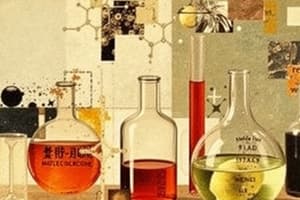Podcast
Questions and Answers
In a reaction involving glucose and oxygen, if 10 grams of glucose produces 0.33 moles of water, how many grams of water are produced?
In a reaction involving glucose and oxygen, if 10 grams of glucose produces 0.33 moles of water, how many grams of water are produced?
- 12.0 grams
- 8.34 grams
- 3.0 grams
- 5.94 grams (correct)
What is the limiting reactant when 0.5 mole of HCl is reacted with 0.7 grams of NaOH, given the reaction HCl + NaOH → H2O + NaCl?
What is the limiting reactant when 0.5 mole of HCl is reacted with 0.7 grams of NaOH, given the reaction HCl + NaOH → H2O + NaCl?
- NaOH
- NaCl
- HCl (correct)
- Water
How would you calculate the percent composition of lithium in Li2O?
How would you calculate the percent composition of lithium in Li2O?
- (30 / 7) x 100
- (2 / 7) x 100
- (16 / 30) x 100
- (7 x 2 / 30) x 100 (correct)
What mass of CO2 is produced when 0.055 moles of glucose are completely combusted?
What mass of CO2 is produced when 0.055 moles of glucose are completely combusted?
What does the term 'molecular weight' refer to in the context of percent composition?
What does the term 'molecular weight' refer to in the context of percent composition?
If a compound has a molecular weight of 30.0 and contains 2 carbon atoms, what is the percent composition of carbon in that compound?
If a compound has a molecular weight of 30.0 and contains 2 carbon atoms, what is the percent composition of carbon in that compound?
In the balanced equation representation, what role do the coefficients of A and B represent?
In the balanced equation representation, what role do the coefficients of A and B represent?
What is the percent composition of hydrogen in H2O?
What is the percent composition of hydrogen in H2O?
Calculate the number of grams of H2O produced when 3.3 moles of NH3 are reacted with excess oxygen.
Calculate the number of grams of H2O produced when 3.3 moles of NH3 are reacted with excess oxygen.
When 12 grams of O2 are used in a reaction that produces NO, how many grams of NO can be produced?
When 12 grams of O2 are used in a reaction that produces NO, how many grams of NO can be produced?
What is the molecular weight (MWt.) of propylene, C3H6?
What is the molecular weight (MWt.) of propylene, C3H6?
If 15 moles of H2O are produced, how many moles of H2 are consumed in the reaction 2 H2 + O2 -> 2 H2O?
If 15 moles of H2O are produced, how many moles of H2 are consumed in the reaction 2 H2 + O2 -> 2 H2O?
Which of the following is the primary purpose of stoichiometry in chemical reactions?
Which of the following is the primary purpose of stoichiometry in chemical reactions?
In the reaction 4NH3 + 5O2 --> 6H2O + 4NO, what is the limiting reactant when 3 moles of NH3 and 5 moles of O2 are present?
In the reaction 4NH3 + 5O2 --> 6H2O + 4NO, what is the limiting reactant when 3 moles of NH3 and 5 moles of O2 are present?
How many grams of O2 are produced when 2 moles of NO are formed in the reaction 4NH3 + 5O2 --> 6H2O + 4NO?
How many grams of O2 are produced when 2 moles of NO are formed in the reaction 4NH3 + 5O2 --> 6H2O + 4NO?
If the molecular weight of H2O is approximately 18.02 amu, how many grams would be present in 5 moles of H2O?
If the molecular weight of H2O is approximately 18.02 amu, how many grams would be present in 5 moles of H2O?
Which ions indicate that a precipitation reaction has occurred?
Which ions indicate that a precipitation reaction has occurred?
Which of the following compounds contains ions that will always be soluble in water?
Which of the following compounds contains ions that will always be soluble in water?
What type of reaction occurs when an acid neutralizes a base?
What type of reaction occurs when an acid neutralizes a base?
Among the compounds listed, which is considered insoluble in water?
Among the compounds listed, which is considered insoluble in water?
Which of the following statements is true regarding heat of reaction?
Which of the following statements is true regarding heat of reaction?
Which of these ions is associated with a gas forming reaction?
Which of these ions is associated with a gas forming reaction?
Which combination of ions will result in no reaction when mixed in solution?
Which combination of ions will result in no reaction when mixed in solution?
What is the defining characteristic of an ionic compound that is soluble in water?
What is the defining characteristic of an ionic compound that is soluble in water?
Flashcards
Avogadro's number
Avogadro's number
The number of molecules in 1 mole of any substance. It's a constant value used to convert between moles and the number of molecules.
Molar mass
Molar mass
The mass of 1 mole of a substance, expressed in grams per mole (g/mol). It's calculated by adding the atomic weights of all atoms in the molecule.
Limiting reactant
Limiting reactant
The amount of reactant that is completely consumed in a chemical reaction, limiting the amount of product that can be formed.
Percent yield
Percent yield
Signup and view all the flashcards
Stoichiometry
Stoichiometry
Signup and view all the flashcards
Enthalpy of reaction
Enthalpy of reaction
Signup and view all the flashcards
Solubility rules
Solubility rules
Signup and view all the flashcards
Exothermic reaction
Exothermic reaction
Signup and view all the flashcards
Endothermic reaction
Endothermic reaction
Signup and view all the flashcards
Gram-to-Gram Conversion
Gram-to-Gram Conversion
Signup and view all the flashcards
Percent Composition
Percent Composition
Signup and view all the flashcards
Theoretical Yield
Theoretical Yield
Signup and view all the flashcards
Combustion Reaction
Combustion Reaction
Signup and view all the flashcards
Decomposition Reaction
Decomposition Reaction
Signup and view all the flashcards
Redox Reaction
Redox Reaction
Signup and view all the flashcards
Precipitation Reaction
Precipitation Reaction
Signup and view all the flashcards
Gas Evolution Reaction
Gas Evolution Reaction
Signup and view all the flashcards
Neutralization Reaction
Neutralization Reaction
Signup and view all the flashcards
Heat of Reaction
Heat of Reaction
Signup and view all the flashcards
Heat of Combustion
Heat of Combustion
Signup and view all the flashcards
Study Notes
Stoichiometry & Chemical Reactions in Aqueous Solution
- Learning Objectives: Students will be able to solve stoichiometric problems, calculate percent composition, understand limiting reactants, understand heat of reaction, and predict if ions react in aqueous solutions.
Moles and Molecular Scale
- Moles provide a link between the molecular and macroscopic scales.
- One mole of any substance contains the same number of molecules as Avogadro's number.
- Mole relates grams of a substance to the number of molecules using molar mass.
Stoichiometric Calculations
- Example: 2H₂(g) + O₂(g) → 2H₂O(l)
- Mass (amu): 4.0 amu H₂ + 32.0 amu O₂ = 36.0 amu H₂O
- Amount (mol): 2 mol H₂ + 1 mol O₂ = 2 mol H₂O
- Mass (g): 4.0 g H₂ + 32.0 g O₂ = 36.0 g H₂O
Limiting Reactants
- Limiting reactant: The reactant used up first in a reaction.
- Excess reactant: The reactant left over after the reaction completes.
- The limiting reactant determines the maximum amount of product formed.
Heat of Reaction
- Exothermic reaction: A reaction that releases heat.
- Endothermic reaction: A reaction that absorbs heat.
- Heat of reaction is proportional to the amount of material.
Percent Composition
- Percent composition: The percentage of each element in a compound.
- Formula: (% element) = [(number of atoms)(atomic weight)] / (molecular weight of compound) × 100
Predicting Reactions in Aqueous Solutions
- Many ionic compounds are soluble in water.
- Ions can react in aqueous solutions under specific conditions: formation of an insoluble solid (precipitate), formation of a gas, neutralization reaction, or redox reaction.
Solubility Rules
- Common compounds containing Na⁺, K⁺, or NH₄⁺ are soluble in water.
- Nitrates and acetates are soluble in water.
- Most chlorides and sulfates are soluble in water (exceptions exist).
- Most carbonates, phosphates, sulfides, and hydroxides are insoluble in water (exceptions exist).
Studying That Suits You
Use AI to generate personalized quizzes and flashcards to suit your learning preferences.




